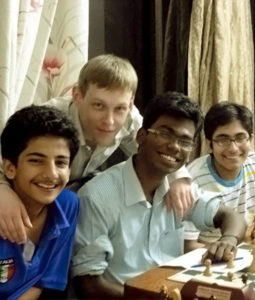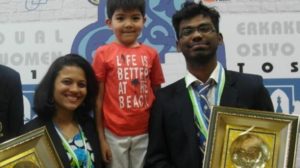Mindhunter: A conversation on chess with Grandmaster S.P. Sethuraman
Grandmaster S.P. Sethuraman lifted the Barcelona Chess Open trophy late last month, thus securing his first tournament win after a gap of five years. However, even his mere participation in the event wasn’t a foregone conclusion until the very end.
Speaking to Times of India after the win he said: “I didn’t have plans of being part of the Barcelona Open. Since Kartikeyan Murali and others were heading for this competition, I too decided to participate in it.”
Even after making that decision, travel issues cropped up. The vaccine he was administered for Covid-19 is called Covaxin which, at the time of writing this article, hasn’t been approved by the WHO.
“We never used to think much about travel and accommodation before travelling abroad for tournaments but nowadays you’re not even sure you’ll reach there!” he says.
The win wasn’t straightforward either, even though Sethuraman managed to stay unbeaten in the tournament’s entirety. Going into the final three rounds he was a whole 1.5 points behind leader Aram Hakobyan but won all his remaining games to clinch the title.
Summing the experience up, he says: “ It was quite unexpected but this win definitely means a lot.”
A week after the triumph, Sethuraman sat down with The Sports Gazette, and in a fascinating conversation offered insights into wide-ranging topics such as his entanglement with the game, pre-tournament preparation and the current state of chess in India.
Talent and hard work
Coming from a chess family, Sethuraman was exposed to the game at an early age. His father, a FIDE rated player himself was his first coach, but soon he started training with grandmasters to expand his horizons. The first one was R.B. Ramesh, a renowned chess coach from Chennai – the same city as Sethuraman. The second one however, was GM Alexander Goloshchapov from Ukraine.
“He flew to India,” he says. “He stayed in my home for almost two to three weeks and got adjusted to Indian food as well so that was quite special!”

GM Alexander is known to work his students hard, and Sethuraman was no exception. Speaking of the training he says: “It was very disciplined and very hard. We used to work for almost eight hours everyday and aside from that there would be physical training. He (GM Alexander) paid a lot of attention to that.”
With such a training schedule, not to mention tournaments and the associated travel, it’s only natural to wonder how Sethuraman managed to balance chess with academics.
“I did my schooling at Velammal and they provided a lot of support. They told us that just turning up for exams would be enough and they’d take care of everything else. They even granted holidays when we had to travel for tournaments,” he says.
No surprise then that the institution counts many successful chess players among its alumni, including India #3 and World #61, Baskaran Adhiban.
Style of Play
Sethuraman’s style of play is known to be dynamic and flexible, and within chess circles he is known as an opening specialist. It is with this style that he won the 2009 under-16 World youth chess championship in Turkey, a win that he described in the past as a “major breakthrough in my career.”
That win proved to be a precursor to greater successes, as he completed the third of his three mandatory GM norms in 2010, becoming India’s youngest Grandmaster at the time. Throughout the next decade, he competed in strong tournaments including three chess World Cups, but reached for the 2016 Asian Championship when asked for his career’s zenith.
What happened in the final round of that tournament is the stuff of legend. Going into it, Wei Yi (World #25) and Le Quang Liem (World #30) were battling for first place. Indian GM Surya Shekar Ganguly (with the black pieces) faced Liem and Sethuraman (also with the black pieces) came up against Wei Yi. The tournament leaders were beaten in both games, and the day ended with Sethuraman crowned champion.

“It’s special because it was also very unexpected. Just like the Barcelona Open, I was far behind going into the final few rounds. My goal was just to qualify for the World Cup next year. But I managed to win the whole thing!” he recollects.
On the topic of playing style however, he adds: “ These days you can’t rely on one style to get you to the top I feel, because when you play against stronger players it can backfire badly. When I was growing up, players were definitely branded as defensive, strategic, aggressive etc. but nowadays players have to be universal. Having said that, if you are a naturally aggressive player, then spectators will enjoy your games more, which will get you more opportunities.”
Sethuraman identifies that last point as a chink in his personal armor as well.
“My problem sometimes is I go all out, desperately for a win in positions that I can’t. I have to make peace with myself and take a draw but I don’t do that. Because that doesn’t come naturally to me but those things have to be consciously cultivated.
“It’s easy to look back after the game and say this but it needs to come during it and that takes a lot of time.”
Preparation
Chennai is known to be one of the strongest chess cities in the world, and one of the reasons for that is a strong sense of community that exists between its top players – one that breeds cooperation and collaboration.
Happy Birthday to the humble, witty, and evergreen inspiration @vishy64theking😁. pic.twitter.com/wd0fMgU4Jx
— Sethuraman (@sethuramanchess) December 11, 2020
“In chess, there is no fixed routine like there is in physical sports because there are so many things you can do. Generally when I’m at home I call friends over – if they are free we work together. Working alone is quite difficult as after three to four days you get quite bored.
“When they are there, we’ll have a camp – solving puzzles, playing some training games, working on openings and so on. If we are playing in the classical time format, we don’t normally exceed one game a day but with blitz we can play many – so we accumulate many ideas in a short span of time. It benefits everyone.
“When I’m alone it is a similar sort of schedule but with books and self-analysis and of course keeping up with games around the world,” he adds.
The mention of books is interesting, as the ubiquity of chess engines have seen books lose some of their relevance in the mind of a modern player. Sethuraman however, makes an important point to champion their importance.
“In general, these days many people are not able to sit patiently and read books. In a chess sense, it definitely isn’t easy especially when all your peers are using computers.
“Thing with engines is, you press one button and it keeps giving you the evaluation and moves so in the long term your ability to think narrows down which definitely affects practical play.
“But at the same time, it does help things like your resistance (finding refutations to the top suggested moves). So maintaining a balance is good.”
Chess in India
The Indian chess federation is ranked #4 in the world, but considering the rate at which the country is currently producing elite players, many believe that number will soon be higher.
The logistics needed to aid chess players in their preparation has been getting some attention recently, with the construction of a professional chess village in Bangalore expected soon – incorporating inputs from some of the country’s finest players including GM Sethuraman.
2022 will see the expansion of the Meltwater Champions Chess Tour, and the inauguration of a $100,000 Indian chess circuit in partnership with esports giant Mobile Premier League (MPL), from which players will qualify for the overall tour. It means, India will become the only chess nation with its own regional expansion that can guarantee players on the elite tour.
Announcing ‘MPL Indian Chess Tour’ – the official circuit for Indian players to earn a spot at Meltwater Champions Chess Tour. @srinathchess @Prachura1 @TaniaSachdev @MagnusCarlsen @anishgiri @viditchess @adhibanchess @Rameshchess @vishy64theking https://t.co/gNC3171Phk
— Sunil Kamath (@SunilK1977) August 30, 2021
Several top players from the country post regular content around their games on YouTube, with some even streaming live on Twitch. Judging by the response they get, it is fair to say the number of enthusiasts grows larger by the day.
Speaking on the culture of chess in the country, Sethuraman says: “On my way back from Barcelona, I saw some people playing on chess.com. I had never seen that before, so it looks like people are really into it! Even when I went into some restaurants in Chennai, a few people recognized me which also never used to happen before. It was quite surprising to me. Back in the day people didn’t know anyone other than Anand but things are really different now. It is very nice to see.”
GM Sethuraman’s next tournament is the Sharjah Masters, scheduled to start on 17th September.